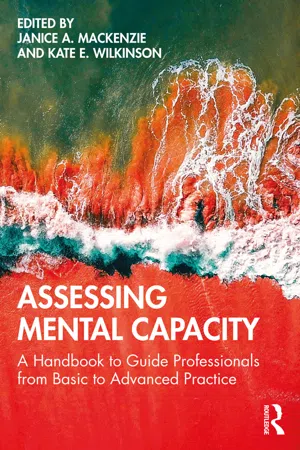
Assessing Mental Capacity
A Handbook to Guide Professionals from Basic to Advanced Practice
- 424 pages
- English
- ePUB (mobile friendly)
- Available on iOS & Android
Assessing Mental Capacity
A Handbook to Guide Professionals from Basic to Advanced Practice
About this book
This practical, how-to handbook provides essential resources to help clinicians and other professionals assess mental capacity in key decisions. The book illustrates the basics of capacity assessments before discussing a variety of complex issues of which professionals will need to be aware. Offering expertise from a multi-disciplinary perspective, the book provides hands-on coverage of mental capacity law (concentrating on England and Wales).
This book is accompanied by online resources including semi-structured interviews and a multi-disciplinary team (MDT) questionnaire which can be downloaded and used for clinical cases, as well as further examples, information and tips. Please visit www.assessingcapacity.com.
Chapters are written by a variety of different professionals with extensive experience in the assessment of mental capacity. Coverage includes:
- Explanations of mental capacity law and how to put it into practice across a range of settings, services and populations
- A "how to" approach for administering assessments of mental capacity both for professionals who are new to the area and for more experienced professionals
- Information on practical aspects of assessing mental capacity for commonly occurring decisions and for more specialist and complex decisions
- Consideration of the best interests process and Liberty Protection Safeguards (LPS).
With easily accessible information, case studies, examples from case law and internationally relevant discussions on ethical issues, this is the perfect companion to help busy professionals understand complex concepts relating to mental capacity.
Tools to learn more effectively

Saving Books

Keyword Search

Annotating Text

Listen to it instead
Information
Part 1
Getting started
Chapter 1
Mental capacity past, present and future
An overview
In this chapter
- The nature of mental capacity and factors that can affect it
- The evolution of legal systems to address the issues it raises
- The limitations of current mental capacity legislation and some of the steps being taken to improve its scope and operation
- The relationship between mental capacity and mental health legislation
- Current levels of knowledge and engagement with mental capacity legislation by service users, carers and professionals and measures to improve uptake of what the legislation offers
- Issues surrounding the assessment of mental capacity and the need for awareness raising and training of professionals to improve the process and outcomes of assessment.
Introduction
- A person can make decisions in advance (advance decisions/directives) about refusing treatments – but not about deciding which treatment he wants.
- He can appoint someone in advance to make decisions for him (powers of attorney).
- Professionals can make decisions on his behalf – often, but not in all cases, based on the principle of ‘best interests’.
- A court can appoint someone (a Deputy) to make decisions on behalf of the affected person.
Factors that may affect mental capacity
- Intellectual disabilities, often present from birth and caused by a range of factors from genes to adverse conditions or events
- Dementia, due to its impact on memory and reasoning
- Brain injury and stroke, which can affect cognition and communication
- Mental health problems, such as psychosis, depression and anxiety, as they can distort the way information is processed to arrive at decisions
- Delirium resulting from infections, drugs and intoxicants, which can temporarily affect mental capacity
- Other causes that prevent a person from thinking clearly and taking in information, such as severe traumatic events, grief or pain.
Summary: Factors that may affect mental capacity
- Health conditions or events that affect perception, thinking, memory or communication
- Cognitive abilities
- Communication ability
- Mood and emotional factors
- Support which presents information about the decision intelligibly and helps the person reach and communicate his/her decision
- The nature of the decision to be taken; more complex decisions are more demanding of the abilities underpinning mental capacity.
The history of mental capacity legislation in England and Wales
Limitations to mental capacity legislation
- Respect inherent dignity, individual autonomy and independence of all people, including the freedom to make their own choices
- Be non-discriminatory
- Allow full and effective participation and inclusion in society.
Table of contents
- Cover
- Half Title
- Title
- Copyright
- Dedication
- Contents
- About the book
- Disclaimer
- List of Appendices
- Acknowledgements
- List of contributors
- Introduction
- Part 1 Getting started
- Part 2 Factors to consider
- Part 3 Specific decisions and conditions
- Part 4 Complex situations
- Part 5 Issues related to the Mental Capacity Act (2005)
- Part 6 Additional considerations
- Appendices
- Index
Frequently asked questions
- Essential is ideal for learners and professionals who enjoy exploring a wide range of subjects. Access the Essential Library with 800,000+ trusted titles and best-sellers across business, personal growth, and the humanities. Includes unlimited reading time and Standard Read Aloud voice.
- Complete: Perfect for advanced learners and researchers needing full, unrestricted access. Unlock 1.4M+ books across hundreds of subjects, including academic and specialized titles. The Complete Plan also includes advanced features like Premium Read Aloud and Research Assistant.
Please note we cannot support devices running on iOS 13 and Android 7 or earlier. Learn more about using the app